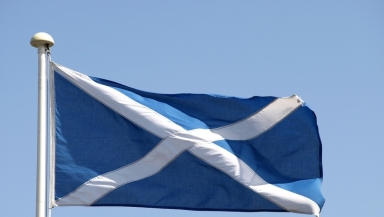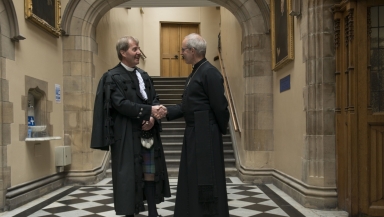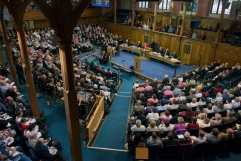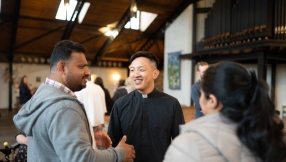
Another year, another annual church assembly, another battle and series of headlines about the church and sexuality. Deja vue. At this year's General Assembly the Church of Scotland 'crossed a Rubicon' (as the Principal Clerk pointed out). It voted by 339 to 215 to allow those in same sex marriages to be ministers. Although, somewhat bizarrely, it will not allow them to marry, or be married in church and it still officially holds to the biblical view that marriage is between a man and a woman. This will doubtless be rectified in the next couple of years when a theological commission reports and new rules will be put in place. It will probably be 2019 before the issue which began in 2009 is settled. Why is it taking so long?
It's not so much the vagaries of Presbyterian procedure that is causing the delay, as it is church politics. There are still a declining number of evangelicals within the Kirk and the Establishment wants to do whatever it can to keep them on board. It was interesting that this year's outgoing moderator, the evangelical Rev. Dr Angus Morrison, was thanked by the incoming moderator for being an evangelical Highlander who managed to keep most of the evangelicals on board. It was as the Moderator said, 'for such a time as this' that he was appointed.
Of course same sex marriage (SSM) was not the only issue discussed – indeed the discussion was very limited. The Church of Scotland also had other issues to face. There was the Columba Declaration - a formal agreement between the Church of England and the Church of Scotland (something which had caused an adverse reaction from the Scottish Episcopal Church). Archbishop Welby spoke to the Assembly and declared that the most significant part of the Columba Declaration was both denominations formally recognising each other as Churches. This came as a bit of surprise to those who had assumed they already did. Meanwhile other Presbyterian churches, such as the Presbyterian Church of East Africa, the Presbyterian Church of Ireland, the United Free Church and the Presbyterian Church of Australia warned that they might have to withdraw from fellowship with the Church of Scotland if it continued on its current course.
Although the Kirk has not quite yet decided on SSM, it has decided that it would be better for the UK to remain in the EU, that the church should disinvest from companies who make their money out of fossil fuels, and that parents should be banned from smacking their children.
The main problem remains the accelerating decline within the church's numbers. This year the Kirk lost over 14,000 members, the equivalent of one church per week being closed. It has 120 vacancies with many more due in the next decade and only 40 ministerial candidates in training. Its congregational demographic is aging with 20 per cent of congregations having no young people and children at all. It was suggested at the General Assembly that it would have to sell around 40 per cent of its buildings within the next decade. With some 350,000 members, the Kirk still remains a force within Scottish society but it is a fading one. The Rev Dr Andrew McGowan warned that although only 3 per cent of ministers had left over the SSM issue, thousands of members had and were continuing to leave. Although there was a great deal of positive talk about fresh expressions, internet initiatives and various new ministry outreaches, the reality is that just as there are arguments about sexuality at every Assembly so there are promises of jam tomorrow.
Meanwhile, across the road the much smaller Free Church of Scotland also had an Assembly. The Free Church is in a period of growth, with around 15,000 members and adherents and 100 congregations. Some of this is due to people leaving the Church of Scotland. Two new congregations were welcomed into the denomination, Broughty Ferry in Dundee and the West church from Inverness – both from the Church of Scotland. One former C of S minister explained how he has been warned that leaving the Kirk would mean heading into the wilderness, but that he had found the wilderness to be a fruitful place! Much of the Free Church's growth is due to new church plants, a renewed emphasis on evangelism and growing numbers of young people coming. The Free Church has 20 ministerial students in its rapidly expanding Edinburgh Theological Seminary which means that new churches and new ministries will need to be started. The Assembly also agreed to look at starting church schools and continuing to develop relationships with other denominations.
As the retiring moderator of the Free Church and a committed evangelical of course I have a bias. But my bias is best summed up in the words of Thomas Chalmers, one of the founding fathers of the Free Church – 'who cares for the Free Church, compared with the Christian good of Scotland'. The Free Church will need to continue to develop, change and reach out if it is to be effective in winning back the lost ground for the Church in Scotland today. And no Christian can be glad at the decline of the C of S. It is distressing to me that the Church of Scotland has lost half its members in a decade and seems to be in freefall.

One small unreported incident perhaps shows where things are going and points to a better future. The delegates from the East African Presbyterian Church left the Church of Scotland Assembly over the decisions on SSM, and came to visit the Free Church. They are a church which was founded by Scottish Presbyterians but which now has four million members in Kenya. They expressed concern at the continuing theological, moral and numerical decline of the Church of Scotland. Perhaps they will be the ones who send missionaries to the UK?
There are churches in Scotland that are growing, not only in the Free Church. In another sign of good things to come Charlotte Chapel Baptist Church, in the centre of Edinburgh has purchased and refurbished the former Church of Scotland, St Georges West, in Edinburgh (at a cost of some £3.5 million). This growing congregation of over 700 people and other FIEC churches, along with charismatic churches such as the growing Destiny churches, and the renewed Free Church, perhaps indicate a different trajectory for the Church in Scotland. St Georges West was the place where the Free Church began, in the Great Disruption of 1843, which itself resulted in a flood of new churches, schools and missionary endeavour. Perhaps its physical renewal is a sign of better things to come, a spiritual renewal for the whole church in Scotland?















